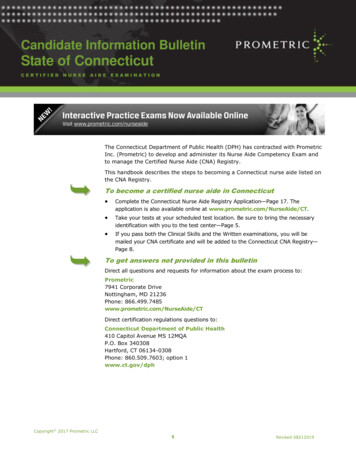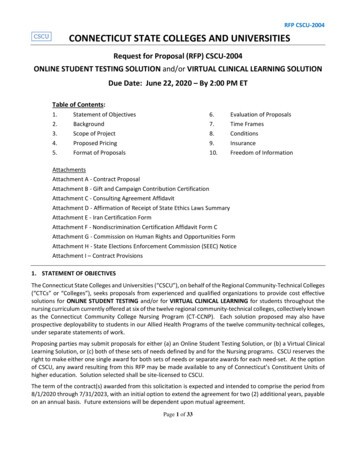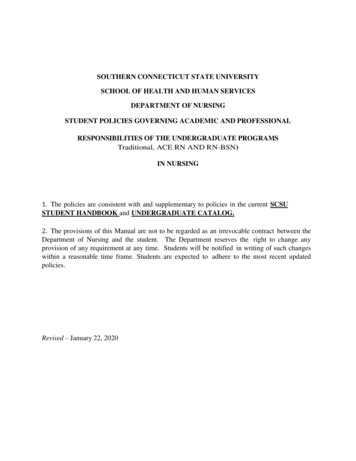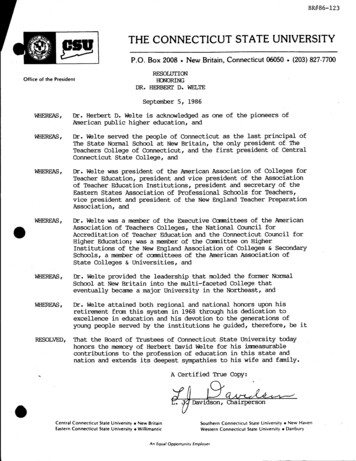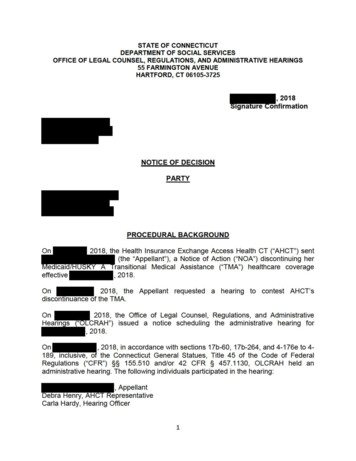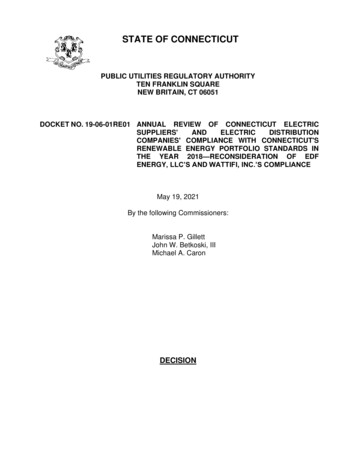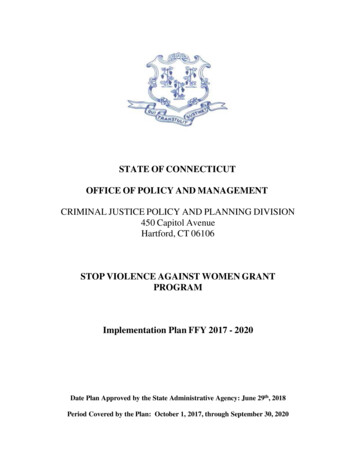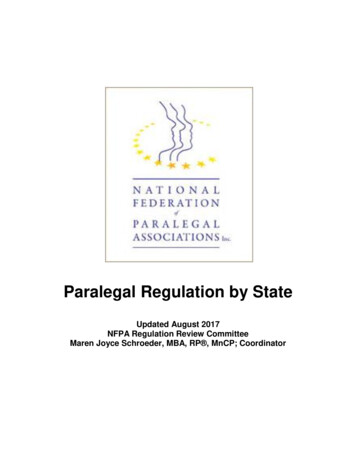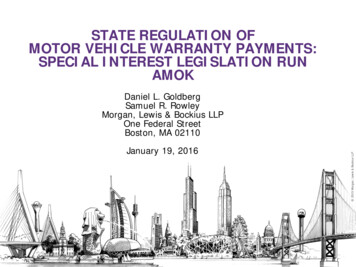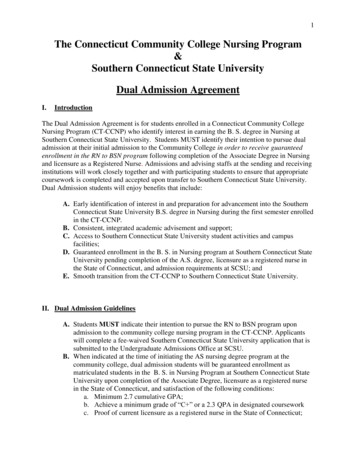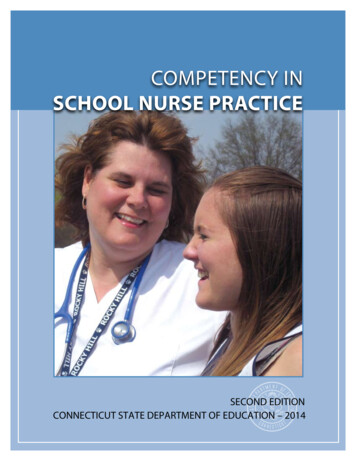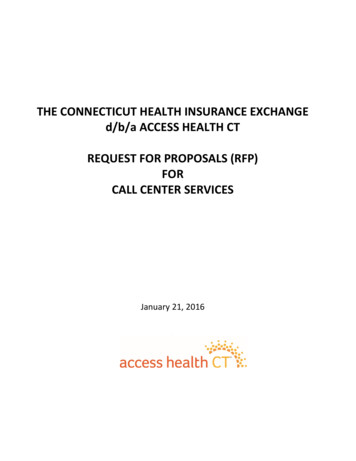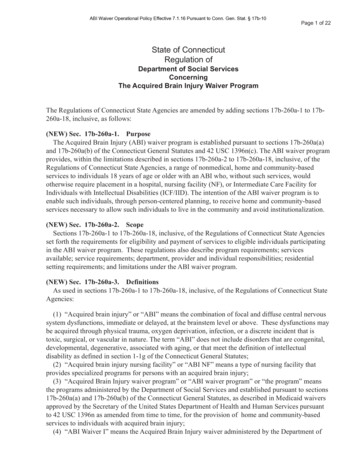
Transcription
ABI Waiver Operational Policy Effective 7.1.16 Pursuant to Conn. Gen. Stat. § 17b-10Page 1 of 22State of ConnecticutRegulation ofDepartment of Social ServicesConcerningThe Acquired Brain Injury Waiver ProgramThe Regulations of Connecticut State Agencies are amended by adding sections 17b-260a-1 to 17b260a-18, inclusive, as follows:(NEW) Sec. 17b-260a-1. PurposeThe Acquired Brain Injury (ABI) waiver program is established pursuant to sections 17b-260a(a)and 17b-260a(b) of the Connecticut General Statutes and 42 USC 1396n(c). The ABI waiver programprovides, within the limitations described in sections 17b-260a-2 to 17b-260a-18, inclusive, of theRegulations of Connecticut State Agencies, a range of nonmedical, home and community-basedservices to individuals 18 years of age or older with an ABI who, without such services, wouldotherwise require placement in a hospital, nursing facility (NF), or Intermediate Care Facility forIndividuals with Intellectual Disabilities (ICF/IID). The intention of the ABI waiver program is toenable such individuals, through person-centered planning, to receive home and community-basedservices necessary to allow such individuals to live in the community and avoid institutionalization.(NEW) Sec. 17b-260a-2. ScopeSections 17b-260a-1 to 17b-260a-18, inclusive, of the Regulations of Connecticut State Agenciesset forth the requirements for eligibility and payment of services to eligible individuals participatingin the ABI waiver program. These regulations also describe program requirements; servicesavailable; service requirements; department, provider and individual responsibilities; residentialsetting requirements; and limitations under the ABI waiver program.(NEW) Sec. 17b-260a-3. DefinitionsAs used in sections 17b-260a-1 to 17b-260a-18, inclusive, of the Regulations of Connecticut StateAgencies:(1) “Acquired brain injury” or “ABI” means the combination of focal and diffuse central nervoussystem dysfunctions, immediate or delayed, at the brainstem level or above. These dysfunctions maybe acquired through physical trauma, oxygen deprivation, infection, or a discrete incident that istoxic, surgical, or vascular in nature. The term “ABI” does not include disorders that are congenital,developmental, degenerative, associated with aging, or that meet the definition of intellectualdisability as defined in section 1-1g of the Connecticut General Statutes;(2) “Acquired brain injury nursing facility” or “ABI NF” means a type of nursing facility thatprovides specialized programs for persons with an acquired brain injury;(3) “Acquired Brain Injury waiver program” or “ABI waiver program” or “the program” meansthe programs administered by the Department of Social Services and established pursuant to sections17b-260a(a) and 17b-260a(b) of the Connecticut General Statutes, as described in Medicaid waiversapproved by the Secretary of the United States Department of Health and Human Services pursuantto 42 USC 1396n as amended from time to time, for the provision of home and community-basedservices to individuals with acquired brain injury;(4) “ABI Waiver I” means the Acquired Brain Injury waiver administered by the Department of
ABI Waiver Operational Policy Effective 7.1.16 Pursuant to Conn. Gen. Stat. § 17b-10Page 2 of 22Social Services, as authorized by section 17b-260a(a) of the Connecticut General Statutes andapproved by the Secretary of the United States Department of Health and Human Services with aninitial effective date of January 1, 1999;(5) “ABI Waiver II” means the Acquired Brain Injury waiver administered by the Department ofSocial Services, as authorized by section 17b-260a(b) of the Connecticut General Statutes, andapproved by the Secretary of the United States Department of Health and Human Services with aninitial effective date of December 1, 2014;(6) “Acquired Brain Injury waiver services” or “ABI waiver services” means all or some of theservices provided to individuals in the ABI waiver program;(7) “Activity of daily living” or “ADL” means an activity or task that is essential to an individual’shealth, welfare, and safety, including, but not limited to, bathing, dressing, eating, transfers, andbowel and bladder care;(8) “Agency provider” means a provider employed by an agency, who provides ABI waiverservices to individuals participating in the ABI waiver program;(9) “Alternative institutional care costs” means the costs of institutional care that the individualwould otherwise incur, but for the support of ABI waiver services;(10) “Applicant” means an individual who, directly or through a representative, completes an ABIwaiver program application form and submits it to the department;(11) “Applied income” means the portion of the individual’s income that remains after alldeductions and disregards are subtracted and that may be applied to the cost of waiver services;(12) “Assessment” means a comprehensive, multidimensional written evaluation conducted bynonmedical department personnel or agents, using a standard assessment form that is used todetermine whether an individual meets the level-of-care criteria to participate in the ABI waiverprogram;(13) “Chronic disease hospital” or “CDH” means a long-term hospital having facilities, medicalstaff, and necessary personnel for the diagnosis, care, and treatment of a wide range of chronicdiseases;(14) “Commissioner” means the Commissioner of Social Services;(15) “Cost-effective” or “cost-effectiveness” means the department’s determination that paymentsfor the individual’s total service costs do not exceed either the individual caps or available fundingfor the ABI waiver program;(16) “Countable income” means all sources of income not excluded under the Medicaid program;(17) “Department” or “DSS” means the state of Connecticut Department of Social Services or itsagent;(18) “Family member” means a person who is related to the individual by blood, adoption, ormarriage;(19) “Fiscal intermediary” means an agent or agents under contract with the department that isresponsible for: paying providers for services delivered; registering providers; providing training andoutreach to individuals and providers of services under the ABI waiver program; and performingother administrative functions requested by the department;(20) “Hands-on care” means assistance with ADLs provided most often, but not exclusively, byhome health aides. Hands-on care includes the prompting and cueing necessary for an individual toperform ADLs;(21) “Home and community-based services” means Medicaid services provided to an individual inthat individual’s own home or other community-based setting;(22) “Home and community-based setting” has the same meaning as provided in 42 CFR441.301(c)(4)-(5), as amended from time to time;(23) “Hospital” has the same meaning as provided in 42 CFR 440.10, as amended from time to
ABI Waiver Operational Policy Effective 7.1.16 Pursuant to Conn. Gen. Stat. § 17b-10Page 3 of 22time;(24) “Household employee” means a provider who performs ABI recovery assistant I, ABIrecovery assistant II, chore, companion, homemaker, independent living skills training, or respiteservices, and who is employed by the individual and not an agency;(25) “Individual” means a person with an acquired brain injury who is applying for, or activelyparticipating in, the ABI waiver program;(26) “Individual cap” means the maximum allowable total cost of the individual’s service plan;(27) “Integrated work setting” means a work setting where people with disabilities work alongsidepeople without disabilities, for at least minimum wage.(28) “Intermediate care facility for individuals with intellectual disabilities” or “ICF-IID” has thesame meaning as provided in 42 CFR 440.150, as amended from time to time, and is a facilitylicensed by the Connecticut Department of Developmental Services for the care and treatment ofpersons with intellectual disabilities;(29) “Intervention plan” means a document developed by a cognitive behaviorist that identifies thetreatment goals and interventions for the individual and team;(30) “Legal representative” means a guardian, conservator, or an individual holding a power ofattorney appointed to act on the individual’s behalf;(31) “Level of care” means the type of facility, as determined by a care manager or designatedagent of the department, needed to care for an individual if the individual were not receiving servicesunder the ABI waiver program. The types of facilities include: a nursing facility, ABI NF, CDH, orICF-IID;(32) “Medicaid” or “Medicaid program” means medical and health-related services administeredby the state of Connecticut Department of Social Services pursuant to Title XIX of the SocialSecurity Act;(33) “Medicaid Provider Enrollment Agreement” has the same meaning as provided in section17b-262-523(23) of the Regulations of Connecticut State Agencies, except that such agreement mayinclude addenda specific to the ABI waiver program;(34) “Neuropsychological evaluation” has the same meaning as provided in section 17b-262468(17) of the Regulations of Connecticut State Agencies;(35) “Nursing facility” or “NF” has the same meaning as provided in 42 CFR 440.40 and 42 CFR440.155, as amended from time to time;(36) “Other community-based services” means services provided by programs administered by thedepartment that are not part of the ABI waiver program, or services provided by programsadministered by other state or local agencies that are necessary to maintain the individual in thecommunity;(37) “Other medical services” means services that are normally included in the department’spayments to NFs, ABI NFs, CDHs, and ICF-IIDs, and that the individual requires, in addition to ABIwaiver services, to live in the community. Other medical services include: home health care; nursingservices; physical therapy; speech therapy; and occupational therapy;(38) “Person-centered plan” means a service plan developed by the person-centered team thatmeets the requirements of 42 CFR 441.301(c)(1)-(3), inclusive, as amended from time to time;(39) “Person-centered team” means an interdisciplinary group of people organized to assist theindividual to develop and implement a service plan. The planning team consists of a care manager,the individual, the legal representative (if applicable), a cognitive behaviorist, any interested familymembers, or other relevant participants;(40) “Provider” means an agency provider, household employee or self-employed provider whomeets the qualifications established by the department to provide home and community-basedservices under the ABI waiver program, has signed the Medicaid Provider Enrollment Agreement,
ABI Waiver Operational Policy Effective 7.1.16 Pursuant to Conn. Gen. Stat. § 17b-10Page 4 of 22and is enrolled in the ABI waiver program;(41) “Qualified neuropsychologist” means a psychologist who meets the qualifications of section17b-262-468(16) of the Regulations of Connecticut State Agencies;(42) “Rehabilitation hospital” means a facility performing rehabilitative outpatient hospitalservices in accordance with the provisions of 42 CFR 440.20(a).(43) “Representative” means a person who is not a legal representative, and who is acting insupport of an individual;(44) “Self-employed provider” means a person who does not work for an agency, is not ahousehold employee, and meets the qualifications listed in 17b-260a-8 of the Regulations ofConnecticut State Agencies to provide certain services under the ABI waiver program;(45) “Service plan” means an individualized written plan developed through person-centeredplanning that documents the medical and home and community-based services that are necessary toenable the individual to live in the community instead of an institution. The service plan includesmeasurable goals, objectives, and documentation of total service costs;(46) “Supervision or cueing” means daily support such as monitoring, observing, verbal orgestural prompting, verbal coaching and gestural or pictorial cueing that is required in order for theindividual to accomplish an ADL. Supervision and cueing must be required on a contemporaneousbasis with the performance of the ADL, and does not include a reminder or request to perform anADL when the individual does not need support beyond such reminder or request in order toaccomplish the ADL.(47) “Total service costs” means the annualized cost of ABI waiver services, other medicalservices, and other community-based services included in an individual’s service plan that arerequired in order for the individual to live in the community instead of an institution; and(48) “Waiting list” means a record maintained by the department that includes the names, anddates of completed ABI waiver applications, of all individuals who have submitted completedapplications for ABI waiver services and whose applications have been screened and found to befunctionally eligible for the program.(NEW) Sec. 17b-260a-4. Not an EntitlementThe ABI waiver program is not an entitlement program. Services, waiver slots and access toservices under the ABI waiver program may be limited based on available funding and programcapacity.(NEW) Sec. 17b-260a-5.Eligibility(a) An applicant may be eligible to receive coverage for the cost of the services specified insection 17b-260a-8 of the Regulations of Connecticut State Agencies, through the department’s ABIwaiver program, if:(1) The applicant’s countable income is less than 300% of the benefit amount that would bepayable under the federal Supplemental Security Income program to an applicant who lives in theapplicant’s own home and has no income or resources;(2) The applicant is otherwise eligible to participate in the department’s Medicaid program,including any applicable asset requirements, under either the working disabled or long-term careeligibility criteria;(3) The applicant meets the programmatic requirements of subsection (c) of this section; and(4) The applicant is not ineligible for coverage under subsections (d) or (e) of this section.(b) The financial requirements for eligibility are as follows:(1) The applicant’s countable income and assets for purposes of eligibility are determined usingthe same methodologies the department employs in determining the countable income and assets of
ABI Waiver Operational Policy Effective 7.1.16 Pursuant to Conn. Gen. Stat. § 17b-10Page 5 of 22an institutionalized applicant for Medicaid, including, but not limited to, the spousal impoverishmentrules and spousal post-eligibility rules under section 1924 of the Social Security Act, 42 U.S.C. §1396r-5, for individuals with a community spouse.(2) Income eligibility determination for ABI waiver services under this section is based solely onthe applicant’s countable income and does not involve consideration of the incurred medical expensesor any other liabilities that may have been incurred by the applicant.(3) Payment for ABI waiver services is reduced by the individual’s applied income, which iscalculated by determining the amount of the applicant’s countable income remaining after thededuction of an allowance for the personal needs of the individual equal to 200% of the federalpoverty level, as well as any applicable community spouse’s or family allowance, and amounts forincurred medical or remedial care expenses not subject to payment by a third party, as specified in 42CFR 435.726.(c) The programmatic requirements for eligibility are as follows:An individual shall:(1) Be between the ages of 18 and 64 at the time the application is completed;(2) Have an ABI, as defined in section 17b-260a-3(1) of the Regulations of Connecticut StateAgencies;(3) Meet the criteria for one of the level-of-care categories described in subsection 17b-260a-9(d)of the Regulations of Connecticut State Agencies;(4) Have the cognitive ability to actively participate in the development of the individual’s serviceplan or, absent such ability, have a legal representative who acts on the individual’s behalf toperform these tasks. Participation includes, but is not limited to, selection, hiring, direction, andtermination of providers;(5) Voluntarily choose to live in the community by participating in the ABI waiver program;(6) Wish to utilize ABI waiver services;(7) Develop, in consultation with the person-centered team, a service plan that provides assistancethat reasonably addresses and mitigates identified risks;(8) Understand and acknowledge, or the individual’s legal representative shall understand andacknowledge, that there are risks inherent in living in the community; that the individual’s safetycannot be guaranteed; and that the individual accepts full responsibility if the individual chooses tolive in the community, thereby absolving the department from any liability for any and allconsequences that may result from this choice;(9) Understand and acknowledge, or the individual’s legal representative shall understand andacknowledge, that the individual is the employer of any household employees, as defined in section17b-260a-3(24) of the Regulations of Connecticut State Agencies, and shall sign a written documentaccepting full responsibility as the employer of such providers;(10) Maintain eligibility for Medicaid;(11) Need waiver services, which means that the individual needs a minimum of two waiverservices, on at least a monthly basis;(12) Have a total service plan cost that does not cause the ABI waiver program’s expenditures toexceed total appropriated funding limits for the ABI waiver program;(13) Have a total service plan cost that does not exceed the individual cap that applies to theindividual, as set forth in sections 17b-260a-10(a) and (b); and(14) Agree to pay, if applicable, any applied income toward the cost of services rendered under thewaiver, as required under section 17b-260a-11(b).(d) Notwithstanding subsections (a), (b) and (c) of this section, an individual shall not be eligiblefor ABI waiver program services if:(1) The individual:
ABI Waiver Operational Policy Effective 7.1.16 Pursuant to Conn. Gen. Stat. § 17b-10Page 6 of 22(A) Receives services under any other Medicaid waiver program;(B) Has received and benefited from ABI waiver services, no longer requires the services, nolonger meets level-of-care criteria, and can continue to reside in the community without the supportof ABI waiver program services;(C) Has a cognitive or behavioral dysfunction due solely to an intellectual disability or chronicmental illness, rather than an ABI, as determined by a licensed medical professional;(D) Requires inpatient care in an acute care hospital, NF, ABI NF, ICF-IID or CDH, or who isotherwise institutionalized for a period of ninety days or more, provided, however, such durationallimitation may be extended for an additional thirty days upon submission of documentation from amedical professional indicating that the applicant’s discharge is expected within thirty days;(E) Demonstrates consistent and extreme physical, verbal, or sexual aggression toward others;(F) Demonstrates behaviors that violate the law or are contrary to community integrated living;(G) Is currently incarcerated, and not expected to be returned to the community within ninetydays;(H) Lacks mental capacity to participate in the program;(I) Refuses services that are vital to health, welfare, and safety; or(J) Behaves in ways that are detrimental to the individual’s health, welfare, and safety, whichincludes, but is not limited to:(i) Participating in illegal or criminal activity;(ii) Using, or threatening to use, weapons, chemicals, or firearms for the purpose of causing harmor injury to self or others; or(iii) Compromising the safety of caregivers, staff, and others in the home or community.(2) The conditions at the individual’s home or on the grounds of the home are hazardous due to:(A) Illegal or criminal activity;(B) The presence of animals that are dangerous or not properly secured or maintained;(C) Po
services; physical therapy; speech therapy; and occupational therapy; (38) “Person-centered plan” means a service plan developed by the person-centered team that meets the requirements of 42 CFR 44
